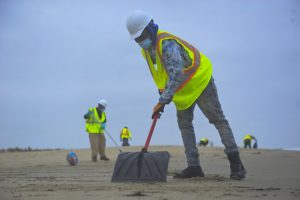
FENWICK ISLAND – As efforts to clean up an oil spill continue, Fenwick Island officials are encouraging community members to report any oil debris found on the beaches.
In a Fenwick Island Town Council meeting last Friday, officials encouraged beachgoers who come across oily debris to report it to state authorities.
“If you see anything out on the beach, please report it but don’t touch it,” Mayor Gene Langan said.
Last week, a command unit consisting of the U.S. Coast Guard and the Delaware Department of Natural Resources and Environmental Control (DNREC) began an operation to clean up an oil spill that deposited blobs of oil – called tar balls – and oiled debris over a stretch of Delaware coastline, extending from the upper Delaware Bay to the tip of the Atlantic Ocean.
And by Friday morning, the cleanup effort intensified with additional resources deployed by state and federal agencies and nonprofit organizations.
Roughly 55 tons of debris – enough to fill four construction dumpsters – had been recovered through Sunday afternoon, according to the Coast Guard, although the source of the oil spill remains unknown. More than 100 personnel have been engaged in the cleanup operation daily over most of the last week, working where needed along the Delaware coastline.
“The job of removing oil from our beaches is challenging and labor-intensive, but we’re making progress,” said DNREC Secretary Shawn Garvin. “Our teams are getting more and more of it off our beaches every hour, every day.”
Surveys over the weekend found small globs of oil and oily debris scattered from Slaughter Beach to the north side of the Indian River Inlet.
An information advisory originally issued for bay beaches last week was extended to some ocean beaches, including Slaughter Beach, Fowler Beach, Prime Hook Beach, Broadkill Beach, Lewes, Cape Henlopen State Park, Rehoboth Beach, Dewey Beach and the Indian River Inlet. The towns of Lewes and Dewey Beach also closed their beaches temporarily due to the oil that washed up on shore.
“Our crews and technology are yielding positive results,” said Lt. Cmdr. Fredrick Pugh, federal incident commander for the response. “We’re seeing a lot of this pollutant coming off of our beaches by the ton and that feels like a high level of productivity, but we’re not letting up. These communities need its beaches back.”
While there had been no reports of oily debris on Fenwick Island’s beaches as of last Friday, Langan encouraged community members to report any findings.
“This is our worst nightmare,” he said. “Hopefully this has happened on a small scale, but we don’t know yet. We don’t know what the source is, where it’s coming from.”
While the oil spill cleanup continues, the Coast Guard and DNREC strongly advise the public not to handle any oily product found or attempt to assist affected wildlife along the shore, but to report these findings to DNREC’s environmental hotline at 800-662-8802 so the situations can be addressed by hazmat-trained professionals.

